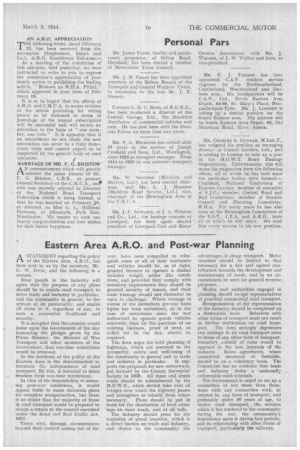Eastern Area A.R.O. and Post-war Planning
Page 19

If you've noticed an error in this article please click here to report it so we can fix it.
PAA STATEMENT regarding the policy of the Eastern Area, A.R.O., has been sent to us by the secretary, Mr. G. W. Irwin, and the following is a resum6.
Most people in the industry will agree that the purpose of any plans should be to enable road transport to Serve trade and industry in particular, and the community in general, to the utmost of its potentiality, and enable all those in it, regardless ofsize, to earn a reasonable livelihood and security..
It is aceepted that the country would insist upon the Government of the day honouring the pledges given by the Prime Minister, the Minister of War Transport and other members of the Government, that war-time restrictions would be removed.
In the forefront ofthe policy of the" Eastern Area is the determinationto maintain the independence of road transport. By this, is intended to mean freedom from war-time restrictions.
In view of the iinpossibility of assessing post-war conditions, it would appear futile. to make elaborate plans for complete reorganization, but there is no doubt that thp majority of those in road transport would be prepared to accept a return to the control exercised , under the Road and Rail Traffic Act, 1933,
Those who, through circumstances beyond their control arising out of the
war, have been cOmpelled to relinquish some or all of their businesses and vehicles should be, as of right, granted licences to operate a similar unladen weight under like conditions, and provided they comply with statutory 'requirements they should be granted security of tenure, and their basic tonnage should not thereafter he open to challenge. Where tonnage in excess of the immediate pre--war basic figure has been authorized, or in the case of newcomers since the war authorized to operate goods vehicles otherwise than by the purchase of an existing business, proof of need, as called for in the Act, should be required.
The Area urges the bold planning of highways, which are essential to the prosperity, safety and well-being of the community in general and to trade
and industry in particular. It supports the proposals for new motorways, put forward by the County Surveyors' Society in 1938. All these and trunk roads should be administered by the M.O.W.T., which should take over all bridges over which the highway passes and strengthen or rebuild them where necessary. Plans should be put in hand for the elimination of level crossings onmain roads, and of all tolls. The industry should press for the remission of penal taxation, which is a_ direct burden on trade and industry, and denies to the -community the advantages of cheap transport. Motor taxation should be limited to that necessary for a fair and agreed contribution towards the development and maintenance of roads, and in no circumstances be used for general revenue purposes.
Bodies and authorities engaged in planning should co-opt representatives of practieal commercial road transport.
Reorganization of the representation of the industry should be completed on
a democratic basis. Relations with other forms of transport must not result in further restrictions on road transport. The Area strongly deprecates any attempt to tie road transport rates to those of any other form of transport. Statutbry control of rates would he opposed to the best interests of -the industry. Rates agreements, 'where considered necessary or desirable, should be on a voluntary basis. The Committee' has no evidence that trade and industry desire a nationally enforceable rates schedule.
The Government is urged to set up a committee of not more than three, none with any connection with, or interest in, any form, of transport, and preferably under 40 years of age, to review road transport, the services which it has rendered to the community during the war, the community's dependence upon it during bad periods, and its relationship with other forms of transport, particularly the railways.




















































